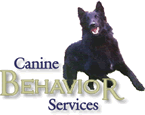Your Weekly Training Tip
April 4, 2010
Happy Easter! Spring is finally, wonderfully here. And with the milder weather comes not only flowers, but kids playing outdoors, people working in their yards and gardens, neighbor dogs getting outside more, squirrels acting squirrely --- in short, lots more going on outside your yard and window, and lots more reasons for your dog to bark! It's time to get back in the swing of reinforcing calm, quiet behavior. I'm going to share one of my favorite training tips with you today: modeling appropriate alerting behavior. I originally learned this technique almost 20 years ago - not from a mentor, fellow trainer, book, or seminar, but from a client, an elderly gentleman who had recently adopted a rescue dog. I was asking him general questions about his dog's behavior, and he mentioned that the dog had been a bit of a barker when he got him, at least when outdoors. I asked how he reacted when his dog barked, and he answered "oh, I just get up and go outside and see what he's upset about. If it's something I should know about, I tell him good boy, and if it's nothing he needs to worry about, I just tell him it's fine, and that's that". Assuming this was my opportunity to wow the old gentleman with my clever training advice, I asked him, maybe a little smugly, the early 90's version of "and how's that working for you?". To my surprise, he said that it had worked well, and that the dog was much quieter in the yard now, and rarely barked at anything that wasn't worth barking at. I was taken aback, maybe even a little annoyed! Could this possibly work? Isn't this giving the dog control of the situation (keep in mind this was many years ago)? This must be a fluke, I thought. But I tucked it away for further consideration and study. I experimented with this with my own dogs (at the time, a adult, very barky rescue German Shepherd, and a young Belgian Sheepdog just learning house and yard rules). Put simply, it worked beautifully. I started experimenting with giving the same advice to clients whose dogs were excessive alarm barkers, as well as teenage dogs just developing their territorial instincts, and now, years later, this is my most frequent advice for alarm barking. I would say that at least 75% of my clients have success reducing alarm barking -and improving their dog's judgement over what is appropriate to bark at - by doing nothing more than this simple technique. So, if your dog seems to bark non-stop at every slight distraction passing in front of your house or yard, try this simple approach:
Considered within a framework of pack behavior, alarm barking is performed by subordinates to alert pack leaders to the presence of a possible problem. It's then the responsibility of the pack leader to decide if it really is a problem, and what, if anything, to do about it. Taking the time to investigate and respond to your dog's alert shows your dog that you respect and appreciate the job he does. I have found that most dogs appear relieved when you take their bark as intended, and over time, grow less frantic in their alerting duties as they learn that their human leader will be coming to evaluate the situation shortly.
Have a wonderful week, and until next time, Happy Training! julie Julie Cantrell BSc, CPDT-KA, CDBC Canine Behavior Services www.k9behaviorservices.com |
Free Dog Training & Behavior Tips If you enjoy our training tips, sign up here to get them in your inbox! With each issue, you'll understand your dog better, and enjoy training more! |
www.k9behaviorservices.com

